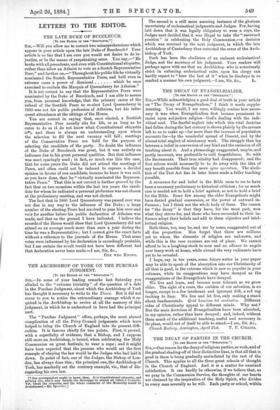THE ARCHBISHOP OF YORK ON THE PURCHAS JUDGMENT.
[To THY EDITOR OF THE " SPECTATOR."] Sra.,.—In some of your leading remarks last Saturday you alluded to the " extreme triviality " of the question of a date in the Parches Judgment, about which the Archbishop of York has thought it necessary to write to the Times. But it did not occur to you to notice the extraordinary courage which it re- qnired in the Archbishop to revive at all the memory of this judgment, in which he is understood to have had the principal part.
The "Parches Judgment" offers, perhaps, the most absurd -complication of all the Privy Council judgments which have helped to bring the Church of England into its present diffi- culties. It is famous chiefly for two points. First, it proved, with a superfluity of evidence, that a Bishop, and I suppose still more an Archbishop, is bound, when celebrating the Holy Communion on great festivals, to wear a cope ; and it might have been expected that the persons who would set the first .example of obeying the law would be the Judges who had laid it down. In point of fact, one of the Judges, the Bishop of Lon- don, has always done this ; the principal one, the Archbishop of York, has markedly set the contrary example, viz., that of dis- regarding his own law.
['Our correspondent ought to know, then. It is Constitutional etiquette, and nothing else, which now forbids the Sovereign to attend all Cabinit Councils. Yet, break the etiquette, and the whole character of the Monarchy would be transformed.—ED. Spectator.]
The second is a still more amusing instance of the glorious uncertainty of ecclesiastical judgments and Judges. For, having laid down that it was legally obligatory to wear a cope, the Judges next decided that it was illegal to take the " eastward position" in celebrating the Holy Communion,—a decision which was reversed by the next judgment, in which the late Archbishop of Canterbury thus corrected the error of the Arch- bishop of York.
Such has been the obedience of an eminent ecclesiastical Judge, and the accuracy of his judgment. Your readers will perhaps agree with me that an Archbishop who is notoriously strict in enforcing ecclesiastical rules upon his clergy can hardly expect to "hear the last of it" when he disobeys in so marked a manner his own judgment. —I am, Sir, &c., L.


































 Previous page
Previous page